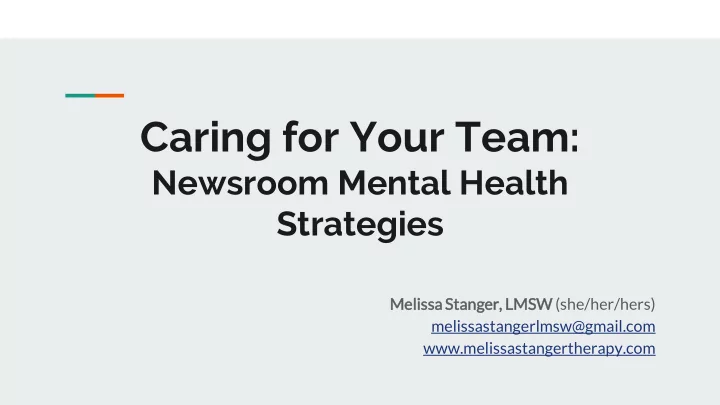

Caring for Your Team: Newsroom Mental Health Strategies Meli eliss ssa Stang tanger, , LMSW (she/her/hers) melissastangerlmsw@gmail.com www.melissastangertherapy.com
Why are journalists especially prone to stress and trauma from major ongoing or recurring stories?
Repeated exposure to trauma, even if it’s someone else’s trauma, can, by itself, be traumatic. Just as therapists can struggle with secondary or vicarious trauma as a result of the work in the ● mental health space, so too can journalists struggle with secondary trauma as a result of reporting on incidents like genocide, racial inequality, and mass shootings ( Backholm & Björkvist, 2012 ). Studies have shown that some journalists reporting on mentally taxing beats struggle with post- ● traumatic stress disorder symptoms not unlike combat veterans ( Keats & Buchanan, 2009 ). This is known as “assignment stress injury.” In addition, many journalists suffer from the recoil of “exposing” a community affected by an ● intimate trauma, including receiving death threats, slander or libel lawsuits, or simply accusations of exploiting a tragedy for professional or personal gain ( Kay et al., 2010 ).
Is experiencing stress when covering stories like this a sign of weakness?
Absolutely not! Many people, even journalists themselves, believe they have to adopt this hard, callous, unaffected ● approach to their work in order to remain impartial and unbiased. Anna Mortimer, a former Moscow correspondent for the Times of London , lost her father, also a ● journalist, while he was on assignment in El Salvador in 1989. “His generation, in the ‘70s and ‘80s, were chain smoki ng, drinking… they wouldn’t have dreamt of getting help,” she told the Columbia Journalism Review . “I see all those people as terribly unwell adrenaline addicts.” Just because you cover hard news doesn’t mean your emotions harden against what you’re ● covering!
What are some signs and symptoms of stress/trauma?
Signs to look out for: A change in mood (particularly depression, anxiety, irritability) ● Spontaneous or sudden outbursts of crying or anger ● A change in work performance ● Hypervigilance, or an exaggerated startle response ● Frequent absences or lateness ● Emotional numbing or lack of affect ● Detachment or distancing from others ●
What can you do if you notice these signs in yourself? What about in someone you work with or supervise?
How to support your newsroom: Create an atmosphere in which talking about trauma and mental health is both normal and ● unstigmatized. Don’t penalize people for struggling! Enroll in a mental health first aid training course (you can find many of these online for free, like ● the one at NYC.gov) to learn how to utilize active listening. Consider administering regular workplace surveys (can be anonymous) to your reporters to take a ● temperature of how your team is feeling about their work, whether they feel supported, and what they would like to see in terms of support. Encourage your team to take breaks when they need to. If reporters feel an expectation to push ● through their negative emotions, the repercussions will be that much worse down the line.
How and where can people find support?
Where to look: Make a list, if you can, of mental health providers in your area that take the company’s insurance or ● that offer sliding-scale fee services. If your organization has an Employee Assistance Program (EAP), make sure that you or HR shares ● information with employees about what is included and how to access it. Check in with HR, also, to see if the company offers designated mental-health days; if not, let ● reporters know that they can use regular sick days to take care of their mental health. ** ***Rea eassure yo your tea eam tha hat the here will ill be e no no pen enal altie ies or or re reper ercussions for or st struggling. If If the hey tak ake e care of their mental health now and often, they’ll be preventing burnout and compassion fatigue, an and prod roducing bett etter wor ork as as a a re resu sult.***
References: Backholm, K., & Björkqvist, K. (2012). Journalists’ emotional reactions after working with the ● Jokela school shooting incident. Media, War & Conflict, 5 (2), 175 – 190. Dart Center for Journalism and Trauma: https://dartcenter.org/. ● Dick, B. (12 August, 2019). Journalists need more help than ever coping with work trauma. ● Columbia Journalism Review : https://www.cjr.org/analysis/journalists-mental-health-trauma.php. Kay, L., Reilly, R., Connolly, K., & Cohen, S. (2010). Help or Harm? J ournalism Practice, 4 (4), 421 – ● 438. Keats, P., & Buchanan, M. (2009). Addressing the Effects of Assignment Stress Injury. Journalism ● Practice, 3 (2), 162 – 177. www.workplacestrategiesformentalhealth.com ●
Recommend
More recommend